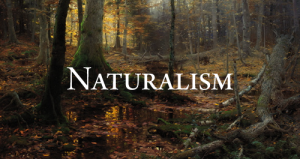Informed naturalism
We can’t take naturalism on faith. It is a worldview like any other, with strengths and weaknesses. Atheists often ignore its weaknesses because they happen to be things atheists don’t care very much about, like God and an afterlife. But we shouldn’t be atheists just because we don’t care about those things! We ought to be atheists because atheism best fits the data.
But naturalism is far from fitting all the data. Explaining morality, consciousness, abiogenesis, dark matter and dark energy should remind all of us that we are still groping in the dark. Science is only a candle against it.
Atheist philosopher, Thomas Nagel, has written a book (Mind and Cosmos) about the weak spots in the naturalistic view of the universe. He concludes that there must be something missing from the neo-Darwinian, essentially mechanistic view of the world. Without invoking gods, he thinks there must be some telos lurking somewhere. This isn’t impossible, and it isn’t crazy. Most naturalists think it’s unnecessary, but they haven’t shown how to explain everything without it.
To conclude, as philosopher Alex Rosenberg does (in The Atheist’s Guide to Reality) that science will eventually fill in all the blanks, is just Naturalism of the Gaps. I would call myself an adherent of scientism (I offer the term ‘scientismist’) and I like Rosenberg and his book, but not his utter faith in scientism. I am a provisional scientismist: it seems that the natural world is all there is, and that all the remaining problems will have natural explanations, but I must admit that I don’t know that for sure. And it won’t do to define the terms so that any new phenomena that are discovered are dubbed ‘natural’ by default. If scientism simply plants its flag on any future event in advance, then it means nothing. That’s shooting the arrow, then drawing the target around it.
Further, the New Atheism has ushered in a New Apologetics. You may know these guys. They are smart and philosophically informed. Many of them have had deep, emotional experiences that they have concluded are not explainable by natural means. If I had had one of those experiences, I might even be a believer. I have no way to know. I am a former believer, but it’s possible that my religious experience was simply weaker than theirs, weak enough so that I could recover from it.
So, the best of these people deserve our respect. If we are to demolish religion, we must demolish the best version of it, and these guys are the ones putting it out. I think it can still be done, but whether you are persuaded to atheism does not seem to depend on the quality of the arguments or the evidence, but whether you are already a believer or a nonbeliever, and whether your psychology allows you to get comfortable believing or not believing.
With all this in mind, it’s vital that we atheists put forth the best version of Naturalism, and openly admit its weaknesses. We can’t just assume Naturalism and present it as the default view.
We do have one very big advantage: almost every modern believer is already a Naturalist, PLUS they believe in supernatural stuff. So, we can argue (as Hector Avalos does), that IF we accept basic methodological naturalism (which most modern believers do), THEN belief in God is not warranted. Avalos points out that it is inconsistent for a believer to be scientific in every area except his religion. I agree.
But to be credible, Naturalism must account for all the data, including the hard stuff mentioned earlier. To whit, Sean Carroll reports on Moving Naturalism Forward, a recent conference dedicated to understanding the outstanding issues facing Naturalism. You can listen in on all the discussions here:
http://preposterousuniverse.com/naturalism2012/
If naturalism stands for anything, it stands for  curiosity, not unshakable certainty.
curiosity, not unshakable certainty.
For more, see:


Recent Comments